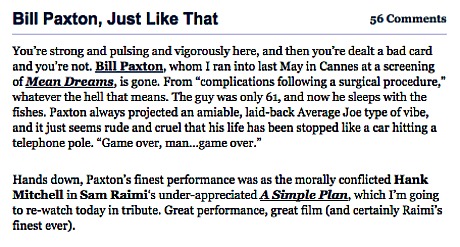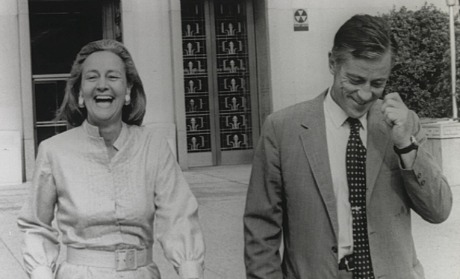Terrence Malick‘s Song to Song opens today. I’ve been reading a lot of reviews in recent days, mainly in search of the best put-downs. The following Pete Hammond line is my favorite thus far: “Malick, in a rare interview, told a SXSW audience that he actually had about eight hours of footage and that Song To Song could have been a miniseries. God help us.” Again, my 3.11 review.
Day: March 17, 2017
Prime Example Of Phony Theatrical “Acting” That Brando, Clift and Dean Helped to Ret Rid Of
Old-school Hollywood acting and writing used to operate on this level all the time, calling bullshit on itself at every turn. Kirk Douglas getting angrier and angrier, then ending his tirade at Lana Turner with “get out, get out…GET OUT!” Atrocious but delicious. With the influence of Marlon Brando and Montgomery Clift peaking in ’52, this proscenium-arch approach to fake-sounding “dialogue” and soap-opera behavior was in its death throes, and yet in the context of a schmaltzy Hollywood melodrama like The Bad and the Beautiful it almost works. Okay, it works. Except there’s no believing it.
I Hate The Leftovers
My loathing for the various imaginings of Damon Lindelof (Cowboys and Aliens, Prometheus, Tomorrowland, this godforsaken HBO series) won’t go away — it’s growing, spreading, metastasizing. If I could make Lindelof disappear from the planet by clapping three times, I would clap three times.
Hefner Recap
I’m not sure about doc footage mixed with renactments, but you tell me. The Playboy brand stopped being a hip thing…when, in 1966 or ’67? And yet Hugh Hefner‘s legend is safe and sound. He was a revolutionary in his time — a hugely successful publisher, entrepeneur and cultural game-changer. A pajama-wearing, pipe-smoking smoothie, a man who was probably blown 10,000 times, the king of the nascent sexual revolution of the ’50s and early ’60s. To have been an honored celebrity guest in Hefner’s Chicago mansion during the Eisenhower, Kennedy or early Johnson administrations! 20-something years ago I sat down with Hef at the L.A. mansion for a magazine piece about celebrity poker games. No babes, no boobs…just an interview on his living-room couch. Imagine if Hef was renowned as a master of cunnilingus in the same way Junior Soprano enjoyed that rep among his criminal cronies and sometime girlfriends. A little more than a decade ago I read a screenplay for a musical based on Hef’s life. I thought it was good but not quite there.
Toole’s Ghost Will Walk Streets of New Orleans
I’m often in touch with New Orleans filmmaker, documentarian and screenwriter Dave DuBos so I’ve no excuse for missing Mike Fleming‘s 2.8 Deadline story about DuBos’ forthcoming film version of Butterly in the Typewriter, based on Cory MacLauchlin’s biography of “Confederacy of Dunces” author John Kennedy Toole.
DuBos wrote the screenplay and will direct the New Orleans-set film starting in May.
Thomas Mann (Me and Earl and the Dying Girl, Kong: Skull Island) will soon begin inhaling pasta, ice cream and cheeseburgers to play the late Toole, who attained Victor Buono-like proportions before offing himself at age 31.

(l. to r.) Butterly in the Typewriter costars Susan Sarandon, Thomas Mann, Diane Kruger.
Susan Sarandon will play Toole’s mom; Diane Kruger will also star.
I love the notion of a butterfly in a typewriter — that darting, dancing, elusive thing that you’re trying to capture when you write. It’s from an unpublished O’Toole poem called “The Arbiter.”
As Dubos’s film is not an adaptation of “A Confederacy of Dunces” and was written about two years ago, the following HE article, posted on 11.16.12, doesn’t apply:
“Any widely admired screenplay that has not been filmed over the period of several years (like, for instance, the various efforts at adapting John Kennedy Toole‘s A Confederacy of Dunces) is either doomed to stay on the sidelines for eternity or it won’t pan out if it finally does get made. And the reason is that oft-referenced rule of creative potency.
Stand Up For Mean Dreams
Ten months ago in Cannes, I was nearly alone in praising Nathan Morlando‘s Mean Dreams (Vertical, 3.17). I called it a handsome, pared-down serving of classic Malick rock — a 21st Century kids-on-the-run tale meets Badlands meets Cop Car meets Ain’t Them Bodies Saints meets A Simple Plan, etc. Variety‘s Guy Lodge and The Hollywood Reporter‘s David Rooney pissed all over it, but now that it’s opened domestically it has a respectable 79% Rotten Tomatoes rating. Tables turned, Lodge and Rooney!
Okay, it also has a 64% Metacritic tally, but that’s because of Rooney and Lodge and two other pissheads — RogerEbert.com’s Nick Allen and Screen Int’l‘s Allan Hunter. Don’t let the views of four measly critics fuck things up. Mean Dreams is a completely decent reworking of a familiar American heartland tale, and if it includes an original riff or two (which Mean Dreams does) then I don’t see a problem.

Some critics are mentioning that seeing Mean Dreams will be your chance to pay a final tribute to costar Bill Paxton, who passed less than three weeks ago. Here’s my obit.
Filed from Cannes on 5.15.16: “Mean Dreams isn’t blazingly original, but I found it a handsome, pared-down thing that doesn’t give in to the usual blam-blam when a gun is purchased and push comes to shove.
“It isn’t how familiar something seems as much as how spare and straight the chops feel. Take, assimilate, make anew. And the quality of the performances, which in this case struck me as near-perfect in the case of co-leads Josh Wiggins and Sophie Nelisse, and a bad-cop, pervy-dad turn by Bill Paxton that…okay, felt a little moustache-twirly at times and yet acceptable enough in the context of greed, alcohol and obsession.
“Plus Colm Feore‘s slightly less corrupt lawman plus Steve Cosens‘ handsome cinematography and a sometimes slammy percussive score by Son Lux…solid as far as it goes.”
The Post Isn’t A Spotlight-Type Thing About The Pentagon Papers
Last night I read a recent draft of Liz Hannah‘s script for The Post, the forthcoming 20th Century Fox film about the Pentagon Papers crisis of 1971. It’s a good script, but my initial dream that it might be some kind of definitive Pentagon Papers saga or a tense newsroom thriller along the lines of Spotlight or All The President’s Men turned out to be…uhm, just that.
The Post, which will topline Meryl Streep and Tom Hanks, will begin filming in May under director Steven Spielberg and be released in December. It’s about how Washington Post publisher Katherine Graham (Streep), who initially saw herself as less than ideally suited to the task and was little more than a blandly embedded figure in Washington social circles, gradually grew some courage and a sense of journalistic purpose during the Pentagon Papers episode, which transpired over a 17-day period in June 1971.

Washington Post publisher Katherine Graham, exec editor Ben Bradlee in the early ’70s.
Hannah’s script is about a testy, at times caustic relationship between Graham and exec editor Ben Bradlee (Tom Hanks) when the N.Y. Times published Neil Sheehan‘s report about Daniel Ellsberg‘s Pentagon Papers documents (which proved that the stated motives and justifications for the Vietnam War were dishonest and deceptive) and the Post debated whether to publish a trove of similar docs, also from Ellsberg, and stand up to the Nixon administration’s legal challenges and threats.
The Post is basically a middle-aged woman’s self-empowerment saga. The project was hatched and nurtured along by producer Amy Pascal.
I wrote the following to a critic friend this morning: “I had no idea Mrs. Graham was so mushy-minded, such a slow-boater, so reluctant to accept the responsibility of first-rate, big-city journalism…even after the N.Y. Times had published the Pentagon Papers, the Washington Post (not Bradlee but Graham, the lawyers and others) was still hesitating, still unsure about whether to publish more of the same…the draft I read is 118 pages and for over 70 pages my constant thought was ‘when is Mrs. Graham going to wake up and man up?’
